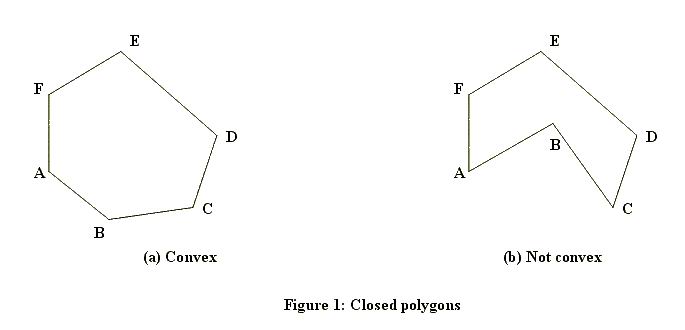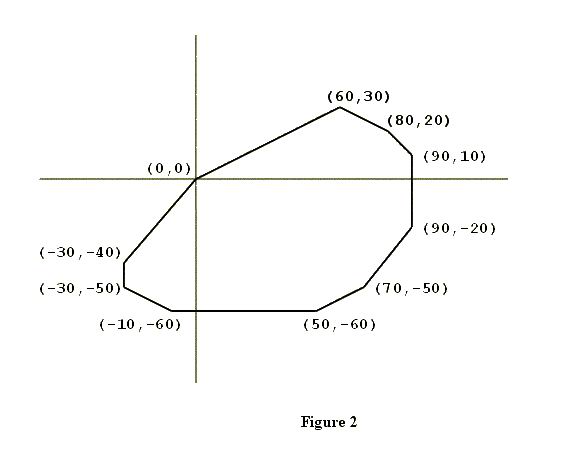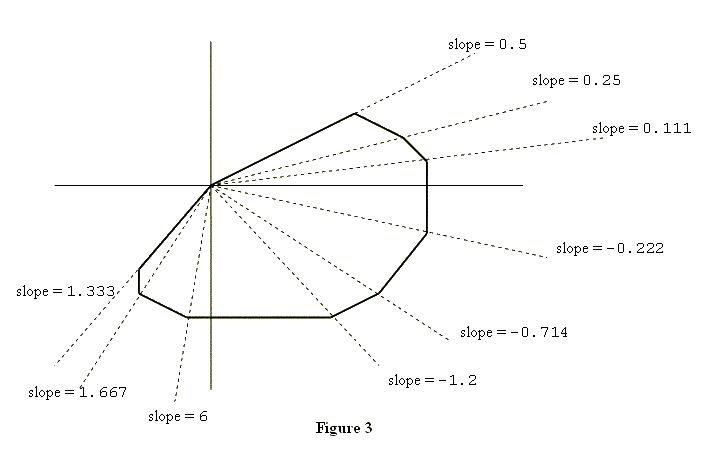POJ 2007 Scrambled Polygon(计算几何 叉积排序啊)
题目链接:http://poj.org/problem?id=2007
Description
A closed polygon is called convex if the line segment joining any two points of the polygon lies in the polygon. Figure 1 shows a closed polygon which is convex and one which is not convex. (Informally, a closed polygon is convex if its border doesn‘t have any "dents".)

The subject of this problem is a closed convex polygon in the coordinate plane, one of whose vertices is the origin (x = 0, y = 0). Figure 2 shows an example. Such a polygon will have two properties significant for this problem.
The first property is that the vertices of the polygon will be confined to three or fewer of the four quadrants of the coordinate plane. In the example shown in Figure 2, none of the vertices are in the second quadrant (where x < 0, y > 0).
To describe the second property, suppose you "take a trip" around the polygon: start at (0, 0), visit all other vertices exactly once, and arrive at (0, 0). As you visit each vertex (other than (0, 0)), draw the diagonal that connects the current vertex with (0, 0), and calculate the slope of this diagonal. Then, within each quadrant, the slopes of these diagonals will form a decreasing or increasing sequence of numbers, i.e., they will be sorted. Figure 3 illustrates this point.


Input
Output
Sample Input
0 0 70 -50 60 30 -30 -50 80 20 50 -60 90 -20 -30 -40 -10 -60 90 10
Sample Output
(0,0) (-30,-40) (-30,-50) (-10,-60) (50,-60) (70,-50) (90,-20) (90,10) (80,20) (60,30)
Source
题意:
给出凸包上的点,其中一个点是(0,0),要求从(0,0)按照逆时针输出所有点。
代码如下:
#include <cstdio>
#include <cstring>
#include <algorithm>
using namespace std;
struct node
{
double x, y;
} p[87];
double cross(node p1, node p2, node t1, node t2)
{
return (p2.x-p1.x)*(t2.y-t1.y)-(t2.x-t1.x)*(p2.y-p1.y);
}
bool cmp(node a, node b)
{
node tt;
tt.x = tt.y = 0;
return cross(tt,a,tt,b)>0;
}
int main()
{
int i = 0;
while(~scanf("%lf%lf",&p[i].x,&p[i].y))
{
i++;
}
sort(p+1,p+i,cmp);
for(int j = 0; j < i; j++)
{
printf("(%.0lf,%.0lf)\n",p[j].x,p[j].y);
}
return 0;
}
郑重声明:本站内容如果来自互联网及其他传播媒体,其版权均属原媒体及文章作者所有。转载目的在于传递更多信息及用于网络分享,并不代表本站赞同其观点和对其真实性负责,也不构成任何其他建议。



































